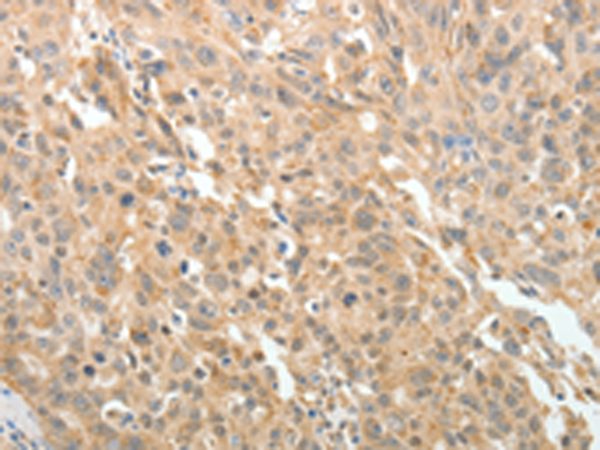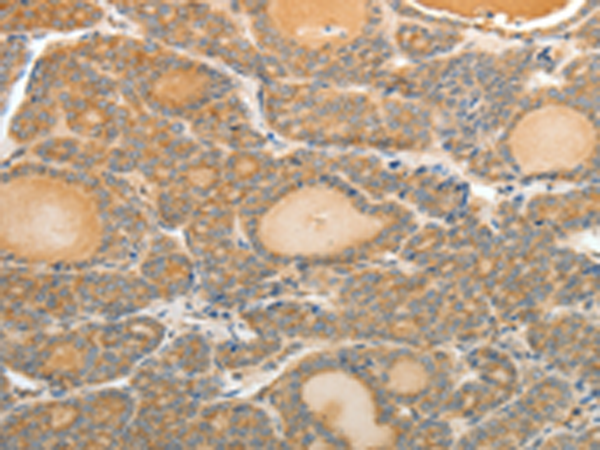

| WB | 咨询技术 | Human,Mouse,Rat |
| IF | 咨询技术 | Human,Mouse,Rat |
| IHC | 1/15-1/50 | Human,Mouse,Rat |
| ICC | 技术咨询 | Human,Mouse,Rat |
| FCM | 咨询技术 | Human,Mouse,Rat |
| Elisa | 1/1000-1/2000 | Human,Mouse,Rat |
| Host/Isotype | Rabbit IgG |
| Antibody Type | Primary antibody |
| Storage | Store at 4°C short term. Aliquot and store at -20°C long term. Avoid freeze/thaw cycles. |
| Species Reactivity | Human |
| Immunogen | Fusion protein of human MAP4 |
| Formulation | Purified antibody in PBS with 0.05% sodium azide and 50% glycerol. |
+ +
以下是3篇关于MAP4抗体的模拟参考文献示例(注:文献信息为示例性概括,具体文献需通过学术数据库查询确认):
1. **文献名称**:*"Microtubule-associated protein 4 (MAP4) antibody validation in neurodegenerative disease models"*
**作者**:Chen L, et al.
**摘要**:该研究系统验证了多种MAP4抗体的特异性,发现部分抗体在阿尔茨海默病脑组织切片中能特异性识别磷酸化MAP4.提示其在神经退行性病变微管稳定性研究中的应用潜力。
2. **文献名称**:*"MAP4K4 inhibition by monoclonal antibody suppresses cancer metastasis in vivo"*
**作者**:Wang Y, et al.
**摘要**:开发了一种靶向MAP4K4的单克隆抗体,通过阻断MAP4K4信号通路显著抑制了乳腺癌小鼠模型的肿瘤转移,为抗MAP4抗体在癌症治疗中的机制提供了实验依据。
3. **文献名称**:*"Role of MAP4 acetylation in cardiac hypertrophy: Insights from antibody-based detection methods"*
**作者**:Sato M, et al.
**摘要**:利用定制MAP4乙酰化抗体,揭示了MAP4翻译后修饰在病理性心肌细胞肥厚中的调控作用,证明该抗体可作为心脏疾病分子机制研究的关键工具。
**建议**:实际研究中请通过PubMed或Web of Science检索关键词“MAP4 antibody”、“anti-MAP4 application”等,筛选近年高被引文献,并优先选择经过抗体验证(如CRISPR敲除验证、多抗体交叉验证)的研究,以确保实验数据的可靠性。
**Background of MAP4 Antibody**
Microtubule-associated protein 4 (MAP4) is a ubiquitously expressed protein that stabilizes and regulates microtubule dynamics in non-neuronal cells. It belongs to the MAP family, which includes proteins like tau and MAP2. but unlike these neuronal counterparts, MAP4 is broadly distributed across tissues, playing a critical role in maintaining cytoskeletal integrity, cell division, and intracellular transport. MAP4 antibodies are essential tools for studying its expression, localization, and function in cellular processes.
Structurally, MAP4 contains a conserved microtubule-binding domain and a projection domain that interacts with other cellular components. Its activity is modulated by phosphorylation, particularly during mitosis, where it coordinates microtubule reorganization. Dysregulation of MAP4 has been linked to pathologies such as cancer, cardiovascular diseases, and neurodegenerative disorders. For example, altered MAP4 expression affects microtubule stability in cancer cells, influencing drug resistance and metastasis.
MAP4 antibodies are widely used in techniques like immunofluorescence, Western blotting, and immunohistochemistry to investigate its role in cellular dynamics and disease mechanisms. These antibodies help identify post-translational modifications, subcellular distribution, and interactions with signaling pathways, providing insights into therapeutic targeting of microtubule-related disorders. Research continues to explore MAP4's regulatory mechanisms and its potential as a biomarker or therapeutic target.
×